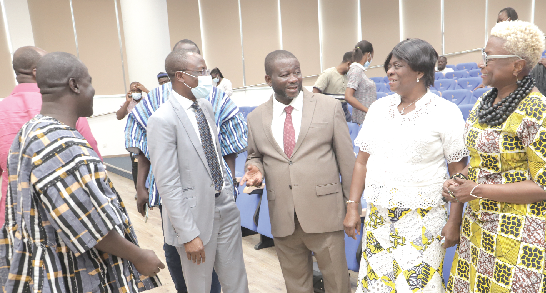
Nadmo disaster risk - Agency warns about inadequate sensitisation to disasters
A study conducted by the United Nations (UN) inter-agency on disaster risk, Capacity for Disaster Reduction Initiative (CADRI), has established that there is inadequate community education and sensitisation to disasters, early warning and climate change in the country.
It said education and early warnings were often given in inadequate language, making it difficult for people to understand the messages delivered.
Advertisement
The findings and recommendations of the study were made known at a validation workshop on the findings organised by the National Disaster Management Organisation (NADMO) in Accra yesterday.
The study
The study was done two weeks ago in five regions, namely Bono East, North East, Volta, Western and Greater Accra.
“The lack of early warning signs and inadequate sensitisation to disasters in the country have serious implications. It means that our disasters will be terrible.
The essence of early warning is to pick it and work against mitigating the impact of the disaster,” the Co-Chair of the inter-agency coordinating group on emergencies and member of the team that conducted the study, Samuel Gmalu, explained.
His presentation was on a preparedness policy and institutional framework.
He explained that because the early signs were not working, they lacked the ability to pick anything and prepare towards it, saying it was the reason that when disasters occurred, where to take rescued people became a problem, and that in some cases those rescued were forced to live with relatives, thereby inconveniencing those relatives.
Early warning signs
He called for a structured way to gather the signs of any emerging disaster, adding that NADMO had to do good disaster risk mapping of every area in order to determine the communities the disasters would be peculiar to and how to deal with them when they occurred.
Mr Gmalu said another finding of the study was that radio stations on which education and sensitisation were done did not have coverage across the regions and, therefore, recommended the provision of infrastructure and communication equipment to facilitate the exchange of risk information.
He said the study further revealed a lack of information on logistics, security and civil-military humanitarian assistance during disaster response, non-availability of contingency plans in some regions and districts, lack of subsistence means for affected people and inadequate budget allocations for the recovery phase.
In his presentation on the study, the Team Lead for the CADRI Diagnosis Mission, Dr Ngoy Nsenga, said the study identified the limited participation of women and youth groups in the stakeholder engagement processes and the inability to engage a lot of institutions at the central level.
Recommendations of the study
In her presentation on governance, a member of the study team, Melody Azinim, mentioned some of the recommendations in the study to include strengthening a gender responsive culture in disaster risk reduction (DRR), metropolitan, municipal and district assemblies to set up DRR desks with focal points to serve as liaison for DRR collaboration, review national building codes in relation to risks and the establishment and enforcement of mechanisms for inspection of compliance of building codes.
The Director-General of NADMO, Eric Nana Agyemang-Prempeh, in a welcome address, expressed the government’s appreciation to the UN agencies and international NGOs in Ghana for their immense financial and logistic support to ensure successful work.



